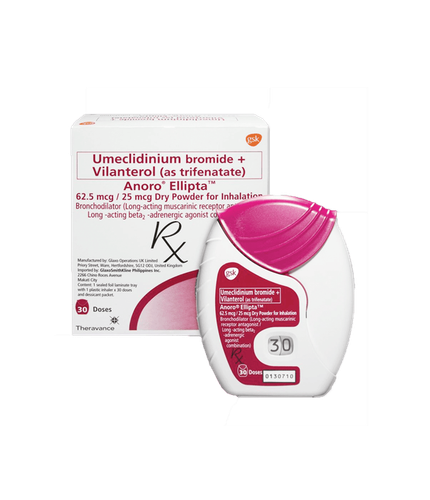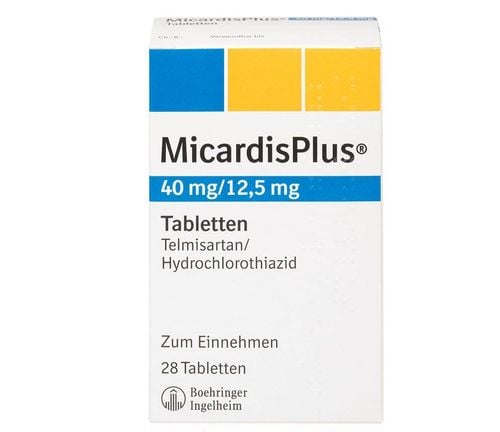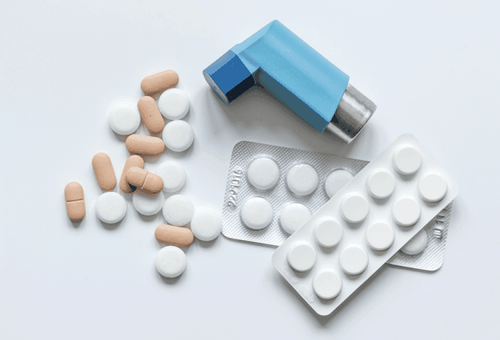This is an automatically translated article.
Ephedrine is a sympathomimetic drug that increases blood pressure by increasing cardiac output and peripheral vasoconstriction. In addition, the drug also works to dilate the bronchi, reduce intestinal tone and peristalsis or relax the bladder wall... The drug is used in the form of tablets orally or injected as prescribed by the doctor. The article will provide more information about the use and use of this drug.
1. Ephedrine effects
What does ephedrine do? Ephedrine belongs to a class of sympathomimetic drugs that act directly or indirectly on adrenergic receptors. Furthermore, the drug also acts on both alpha or beta receptors that carry out release in the central nervous system.
Ephedrine is fairly easily absorbed from the gastrointestinal tract. The drug is not affected by the enzyme monoamine oxidase and is likely to be extensively excreted in the urine unchanged. The drug's life cycle is divided into two parts, the plasma half-life has a duration of 3 to 6 hours depending on the pH of the urine. With more acidic urine, the elimination capacity is increased and the half-life is shorter. When comparing the effects of Ephedrine with that of adrenaline carried out by studies, it was found that the effect of Ephedrine was weaker than that of adrenaline, but the duration of action of Ephedrine was longer.
When using Ephedrine during treatment, the content of this drug can increase blood pressure due to increased cardiac output and cause peripheral vasoconstriction. Tachycardia can occur with the use of Ephedrine, but it is not as common as with the use of adrenaline. In addition, Ephedrine also has a bronchodilator effect, and reduces intestinal tone and motility. In addition, Ephedrine can relax the bladder wall or contract the bladder neck sphincter but relax the pubic muscle. This condition often reduces uterine contractions.
In addition, Ephedrine also stimulates the respiratory center or dilates the pupils but does not affect the light reflexes of the eyes. After using Ephedrine for a while, it is possible to get used to the drug and sometimes it is necessary to increase the dose of the drug used during treatment.
2. Indications and dosage of Ephedrine
Ephedrine drug includes the main ingredient Ephedrine with dosages such as Ephedrine 5mg, Ephedrine 10mg, Ephedrin 30mg. The drug is prepared in the form of 5mg or 10mg capsules or 1 to 3% nasal spray solution or injection form with a dose of 25mg/ml or 50mg/ml syringe. Ephedrine is indicated in the following cases:
Nasal drops: Ephedrine can be used to treat nasal swelling, often accompanied by symptoms of colds, allergic rhinitis or common or inflammatory rhinitis. sinus . Parenteral route: Ephedrine is used to treat hypotension under spinal anesthesia or as adjunctive therapy to lower blood pressure in cases where hypotension has not improved when adequate circulating fluids have been given. For oral administration: Ephedrine is used in the treatment or prevention of bronchospasm and respiratory-related diseases such as chronic obstructive pulmonary disease. However, the drug Ephedrine is not the first choice when treating these conditions. Ephedrine is used only as prescribed by a doctor. The dose of the drug used depends on the health condition as well as the severity of the disease of each individual. You can refer to the dosage information for using the drug below:
For adults, use Ephedrine with a dose to treat nasal swelling with symptoms of colds or sinusitis in the form of nasal drops or spray with a solution. 0.5% translation. The duration of use of Ephedrine should not exceed 7 consecutive days. The dose used in adults to treat swelling under spinal anesthesia can be given as an intramuscular injection at a dose of 25 mg or as a slow intravenous injection at a dose of 5 to 25 mg, then repeated later. 5 to 10 minutes if needed, and can be repeated 3 to 4 hours later. However, the dose of Ephedrine used should not exceed 150mg/day.
Dosage used in the prevention of bronchospasm in asthma: use Ephedrine in oral form with a dose of 15 to 60 mg of Ephedrine hydrochloride or Ephedrine sulfate, used 3 to 4 times a day or used subcutaneously. with a dose of 15 to 50 mg, in case of need, can be repeated injection. The maximum dose should also not exceed 150mg/day
For children using Ephedrine medicine in the treatment of nasal congestion with symptoms of colds, allergic rhinitis or sinusitis, usually in the form of nasal drops or nasal spray. with solutions ranging from 0.25 to 0.5%. The dose should not exceed 7 days and should not be used in children under 3 years of age. The dose used in the prevention of bronchospasm of asthma in children can be used in oral or subcutaneous injection at doses of 3 mg/kg/day and 25 to 100 mg/m2/day, respectively. The drug is used 4 to 6 times a day and the time can be spaced from 4 to 6 hours. In the case of intramuscular or intravenous injection, a dose of 0.2 to 0.3 mg/kg/time can be used and repeated every 4 to 6 hours.
For the elderly, Ephedrine can be used in a slightly reduced dose and the starting dose should be 1⁄2 of the usual adult dose. For patients with renal failure may not need to adjust the dose. However, patients should still be carefully monitored after the initial dose to prevent undesirable effects. An overdose of Ephedrine will not have a specific treatment when poisoning occurs. And in this case only symptomatic and supportive treatment is possible. In addition, you can increase drug elimination by acidifying the urine. In case of fatal overdose in adults about 50mg/kg, in children, the minimum dose that can cause death orally is 200mg.
3. Some notes on the use of Ephedrine
Ephedrine is contraindicated for use in certain subjects such as: people with hypersensitivity to the components of Ephedrine, people with high blood pressure or those being treated with monoamine oxidase inhibitors, people with uncorrected hyperthyroidism, hypokalemic and untreated patients.
Ephedrine can cause some unwanted side effects. The most common side effects occur in the circulatory system with cases of palpitations or central nervous system in susceptible patients, such as insomnia, anxiety, confusion, etc. Less common side effects may include: systemic reactions, headache or sweating or abdominal pain, nausea, or neurological symptoms such as anxiety, restlessness,...
Beyond In addition, when using Ephedrine, caution should be exercised and should not be used after 4 pm, because Ephedrine has a stimulating effect on the nervous system, causing patients to have difficulty sleeping and insomnia. Besides, you should not use it for more than 7 consecutive days. Be careful with people with heart failure , angina pectoris , diabetes . Ephedrine may increase difficulty urinating or patients with an enlarged prostate gland.
Use of non-selective beta-blockers may reduce or completely eliminate the effects of drugs with beta-stimulating properties. Ephedrine may change the ability of other drugs to work or increase the effect of side effects if used in combination. Therefore, when using Ephedrine, it should be prescribed by a doctor to ensure safety for patients.
Follow Vinmec International General Hospital website to get more health, nutrition and beauty information to protect the health of yourself and your loved ones in your family.
Please dial HOTLINE for more information or register for an appointment HERE. Download MyVinmec app to make appointments faster and to manage your bookings easily.













